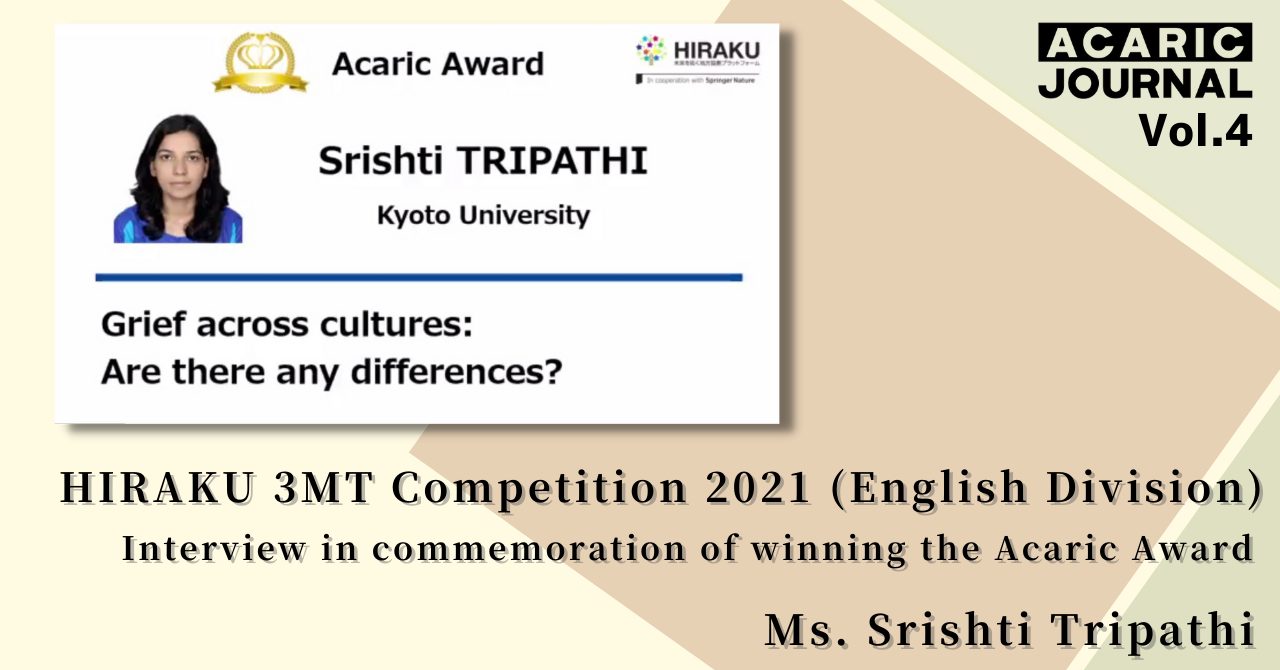「AJ出張版」は、株式会社アカリクが発行する「大学院生・研究者のためのキャリアマガジン Acaric Journal」の過去の掲載記事や、WEB限定の新鮮な記事をお送りするカテゴリです。今回はvol.4の掲載記事をお届けします。
「未来博士3分間コンペティション2021」は博士課程後期学生が3分間の限られた時間内に自身の研究のビジョンと魅力をわかりやすく伝えるスピーチ大会です。本大会において株式会社アカリクは特別協賛を行い、日本語部門・英語部門に対して「アカリク動画賞・Acaric Award」の冠賞を提供しました。本インタビューは英語部門の冠賞を受賞された Srishti Tripathi 氏に、ご研究について伺いました。
― Please tell us briefly about your research titled “Grief across cultures: Are there any differences?”
Broadly, I am working in the area of “affective neuroscience”. That is the study of the neural mechanism of emotion. In my PhD project “Grief across cultures: Are there any differences?”I am examining the differences between people from Asian and Western cultural backgrounds when it comes to the perception of grieving images and short video clips. To find out the underlying neural mechanism I am using a brain imaging technique called “functional near infrared spectroscopy” at the Primate Research Institute, Kyoto University.
― How will your research contribute to solving the problem we have in the current circumstance?
Recently grief disorders have been included in the 11th edition of International Classification of Disease with the name of “Prolonged Grief Disorder” and in the 5th edition of Diagnostic and Statistical Manual of Mental Disorders under the name of “Persistent Complex Bereavement Disorder”. The experience of losing a close one is known to be capable of precipitating depression and posttraumatic stress disorder, but still to many health practitioners, the concept of grief disorder is new and therefore unfamiliar. Due to the COVID-19 many people have lost their family and close friends. There are many students (including me) and professionals that got stuck in different countries and could not meet their families or attend funerals. There is a high probability that grief disorder can be a global health concern in the near future.
My current study can be very helpful in understanding the individual differences in grief perception among people belonging to different cultural backgrounds and in helping those who seek help to overcome their grief in their host country. Moreover, it will prepare us to understand people from different cultural backgrounds and respond to them in a way that is meaningful for them and ourselves in the process of healing from the loss of loved ones and trying to improve overall quality of life. Grief remains a debilitating problem for millions around the world that negatively affects adjustment in our personal and work life. I hope to provide information that can help people overcome long term grief and can focus on the brighter side of life.
― Do you have any plan on how you will cut your way in the future?
My preliminary results show that people from Asian and western cultural backgrounds perceive grief differently. Further I have collected and analyzed the brain imaging data to better understand the neural correlates of grief. From my PhD work outcome, I hope to better understand the grief across cultures. So far there is no official intervention technique developed for Asian culture even in DSM 5. The diagnosis and intervention criteria are based on western databases. I am looking forward for collaborations with research teams who are interested and working on diagnosis and intervention of pathological grief in Asian population. Currently I am focusing on East Asian cultures, but in near future I would like to conduct experiments on South Asian culture people and get a holistic view of how people deal with grief and investigate associated underlying neural mechanisms of it.



